
Zool 2 is a side-scrolling platform video game originally developed by The Warp Factory and published by Gremlin Graphics for the Amiga in November 1993. It is the sequel to the original Zool, which was released earlier in 1992 on various platforms.

Raiden is a 1990 vertically scrolling shooter arcade video game developed by Seibu Kaihatsu and published by Tecmo in Japan. The game's story takes place in the year 2090, when an alien species known as the Crystals invaded Earth. Players assume the roles of the Vanquish Crystal Defense pilot duo, taking control of two state of the art Fighting Thunders aircraft to defeat the Crystals and save the Earth.

Pinball Fantasies is a 1992 pinball video game originally developed by Digital Illusions and published by 21st Century Entertainment in Europe for the Amiga home computers. It is the sequel to Pinball Dreams, which was released earlier in the same year on multiple platforms. In the game, players can choose between any of the four available playfields, both of which have their own thematic and main objectives in order to obtain the highest score possible.

Soccer Kid is a 1993 side-scrolling platform game developed and published by Krisalis Software in Europe for the Amiga. The player assumes the role of the titular main protagonist who travels across several countries around the world to repair the World Cup by retrieving pieces that were scattered by the alien pirate Scab, the main antagonist who failed to steal and add it to his trophy collection in a robbery attempt. Its gameplay mainly consists of platforming and exploration elements, with a main single-button or two-button configuration, depending on the controls setup.
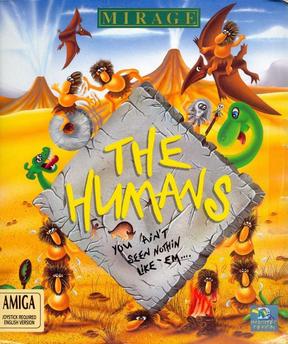
The Humans is a puzzle-platform video game developed by Imagitec Design in Dewsbury, England and originally published by Mirage Technologies for the Amiga in May 1992. It was later ported to other home computers and consoles. The goal of the game varies per level but usually revolves around bringing at least one of the player-controlled humans to the designated end area marked by a colored tile. Doing this requires players taking advantage of the tribe's ability to build a human ladder and use tools such as spears, torches, wheels, ropes and a witch doctor in later levels.
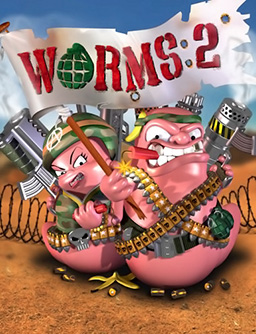
Worms 2 is a 1997 artillery tactical game developed and published by Team17 and released for Windows. It is part of the Worms series and a sequel to the 1995 game Worms. As with the first game, players control their team of worms in combat against each other, using a wide collection of rockets, grenades, firearms, explosives, and air strikes, some eclectic and others bizarre. Also as with the first game, the objective is to eliminate all opposing worms and become the sole surviving team.

Worms is a 2D artillery tactical video game developed by Team17 and released in 1995. It is the first game in the Worms series of video games. It is a turn based game where a player controls a team of worms against other teams of worms that are controlled by a computer or human opponent. The aim is to use various weapons to kill the worms on the other teams and have the last surviving worm(s).
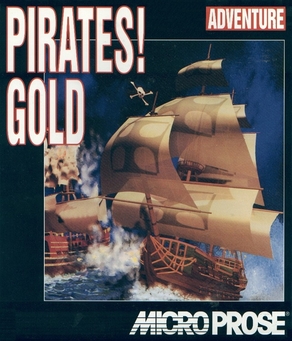
Pirates! Gold is a 1993 computer game, a remake to Sid Meier's 1987 release, Sid Meier's Pirates!.

Cobra Mission: Panic in Cobra City is an MS-DOS adventure game published in 1992 in North America by Megatech Software as a port of the 1991 PC-98 Cobra Mission (コブラミッション) game by INOS. This was the first eroge released in English.

Bomberman is an action-maze video game originally developed and published by Hudson Soft for the PC Engine in Japan on 7 December 1990 and later in North America for the TurboGrafx-16 by NEC in 1991. Belonging to the Bomberman franchise, it is a re-imagining of the first game in the series starring White Bomberman on a quest to rescue Lisa, the kidnapped daughter of his inventor Dr. Mitsumori, from the castle of Black Bomberman while defeating evil monsters and villains that work for him. The game was later ported to home computers, each one featuring changes compared to the original version. Conversions for other platforms were in development but never released. The title garnered positive reception from critics since its initial release on the PC Engine/TurboGrafx-16 and later on home computers.
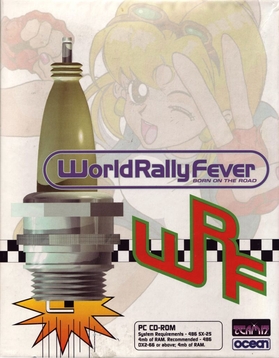
World Rally Fever: Born on the Road is a racing game created by Belgian developers Split alongside British developer Team17. The game was released by Team17 on May 5, 1996, and was originally published in the UK by Ocean Software. It also offers typically involves timed stages where drivers navigate through challenging routes, often in off-road environments. It was later re-released by Sold-Out Software. World Rally Fever featured anime style art and characters which raced cart-like vehicles through various world-themed tracks, such as Scotland, France, the United States, Japan and several other nations.

Baldies is a 1995 real-time strategy video game developed by Creative Edge Software and originally published by Atari Corporation for the Atari Jaguar CD. It was later ported to the PC, PlayStation, and Sega Saturn. In the game, the player manages a community of Baldies in order to build structures, increase their population, and create weapons to fight against enemies known as Hairies. There are four classes of Baldies and each structure has specific properties to assist the player. Its gameplay combines strategy with simulation and god game elements. Up to four players can participate in a multiplayer mode via local area network (LAN) on PC.

Chessmaster 7000 is a 1999 chess video game developed and published by Mindscape for the Windows. It is part of the Chessmaster series.

Escape from Monster Manor is a first-person shooter video game developed by Studio 3DO and published by Electronic Arts exclusively for the 3DO.

Robinson's Requiem is a 1994 survival simulation video game developed and originally published by Silmarils exclusively in Europe for the Atari ST, Atari Falcon and Amiga. Taking place in the 22nd century where Earth and colonized planets are facing overpopulation, the game sees players assuming the role of Robinson officer Trepliev 1 from the Alien World Exploration department in his attempt to escape imprisonment from the fictional planet of Zarathustra alongside another AWE Robinson named Nina1, while facing several hostile creatures and dangers in order to survive.

PC Games is a monthly-released PC gaming magazine published by the Computec Media GmbH in Germany.

Metal & Lace: The Battle of the Robo Babes is a 1993 fighting game published by Megatech Software in North America for the MS-DOS. Set in the year 2053 and featuring an all-female cast of seven "MeCha" robots, the players participate on a "RoboFighting" tournament at MeCha island. The gameplay consists of one-on-one fights using a main two-button configuration and features special moves.

Premier Manager 97 is a football management simulator video game developed by Gremlin Interactive and published by Sega for the Mega Drive in 1996. A PC version was released in 1997. It is the fourth game in the Premier Manager series.
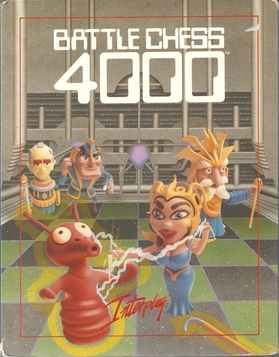
Battle Chess 4000 is a 1992 chess video game developed and published by Interplay Productions for the MS-DOS. It is a sequel to Battle Chess II: Chinese Chess and the third and final game in the Battle Chess series.
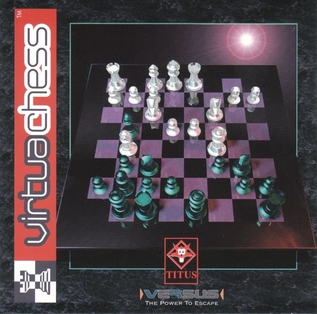
Virtua Chess is a 1995 chess video game developed and published by Titus France SA for the MS-DOS. It was later ported to Windows. Two sequels were released: Virtual Chess 2 for the Windows in 1997 and Virtual Chess 64 for the Nintendo 64 in 1998.





















